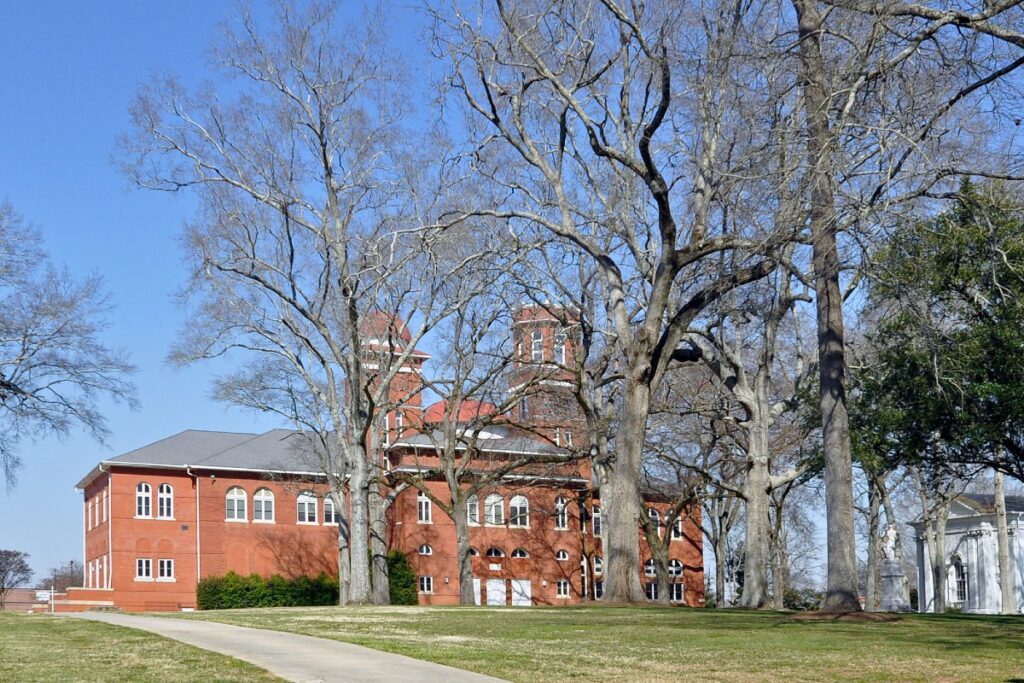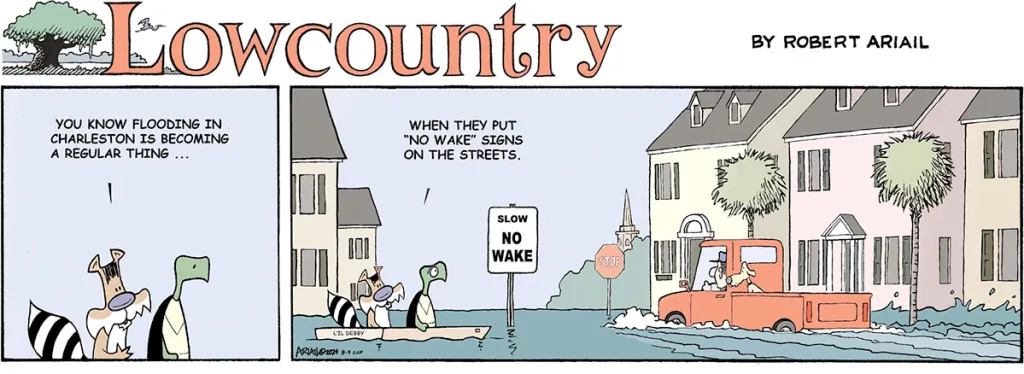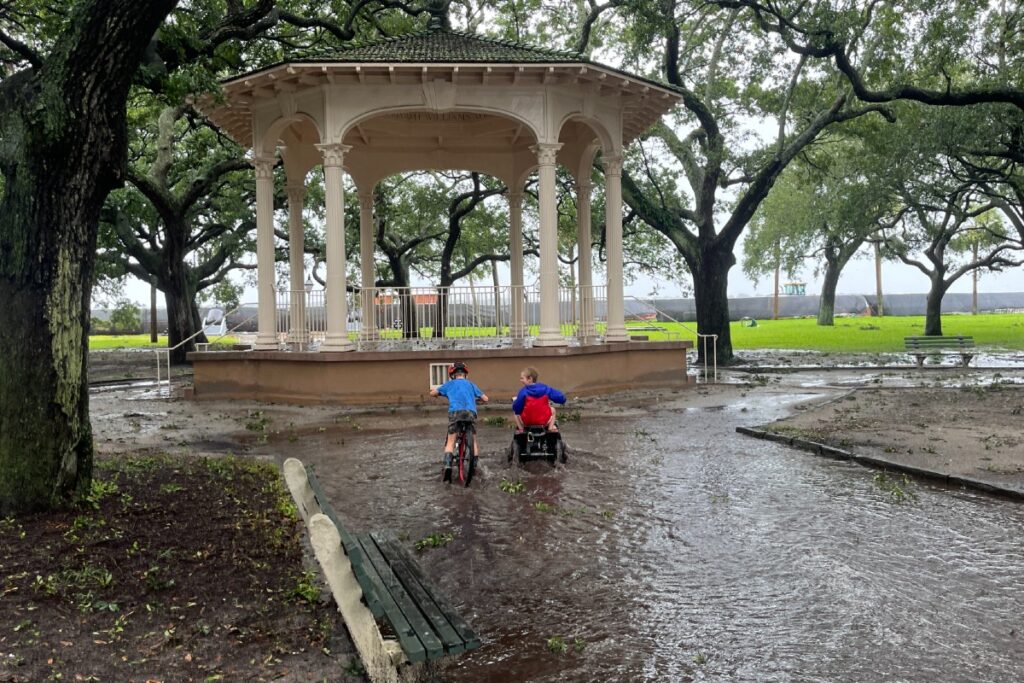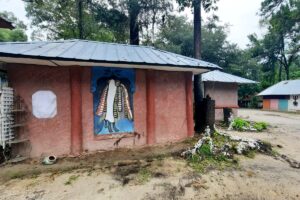STATEHOUSE REPORT | ISSUE 23.32 | Aug. 9, 2024
BIG STORY: Weak state charter law led to problems, critics say
MORE NEWS: Threat of rising rivers worries state officials
LOWCOUNTRY, Ariail: No wake zone!
COMMENTARY, Brack: Learn how hospice care is a blessing
SPOTLIGHT: S.C. Farm Bureau
MYSTERY PHOTO: Playing in the mud
FEEDBACK: Send your thoughts
Weak state charter law led to underperforming schools, critics say

By Jack O’Toole, Capitol bureau | Critics of South Carolina’s charter school law say two bombshell lawsuits in rural Anderson County shine a light on the law’s principal deficiency — a charter school oversight system that lacks meaningful accountability for student outcomes.
For years, studies have found that S.C. charter schools consistently fail to live up to their promise of academic excellence in a publicly-financed setting, despite a number of high-performing charters like Meeting Street Academy-Spartanburg and Orange Grove Charter School in Charleston.
Most recently, Stanford’s Center for Research on Education Outcomes (CREDO), which has been studying charter schools since 2009, reported in 2023 that Palmetto State charter school students underperform their public school peers in reading and math. This finding placed charter schools in South Carolina, which proponents hail as a model for charters, near the bottom nationally. S.C. is one of only three states where charter students aren’t overperforming on academics.
‘Authorizer shopping’ and a lack of accountability
When South Carolina passed its charter school law in 1996, the basic concept was popular among education reformers and parents in both parties. For Democrats, it offered school choice within the existing public school system. For Republicans, it promised independently-governed schools where parents and principals, not state-level education bureaucrats, would call the shots. And for parents, it provided the promise of excellence from a system that had ranked among the nation’s worst for generations.
The key, everyone agreed, would be accountability. Successful charters would be allowed to grow and prosper; failing charters would be shut down when they failed to deliver results.
To that end, South Carolina’s law required charter schools to be sponsored by the state-run S.C. Public Charter School District or an institution of higher learning. These sponsors, or authorizers, would be responsible for holding their charter schools to high standards – and closing their doors if they failed to meet them.
But in the years since, only two colleges, both private, have chosen to become authorizers: Erskine College and Limestone University. And in a number of instances, failing charters have been allowed to move from one authorizer to another to avoid closure – a process of “authorizer shopping” that critics say stems from loopholes in the law and the profits sponsors reap from the schools they regulate.
Dueling lawsuits
Two closely-watched lawsuits in Anderson County demonstrate the fraught, and allegedly incestuous, relationships that can develop between authorizers and their schools.
In the first suit, filed May 9, Erskine College claims that Icelaven Development Group – which operated three high-performing, Erskine-sponsored charter schools under the Reason & Republic brand – is in default on a 2021 loan of $1 million from the college.
But in a July 18 countersuit, Icelaven and its primary owner, James Galyean, tell a very different story.
According to Galyean, the $1 million wasn’t a loan at all. Instead, it was a direct investment in Icelaven for which Erskine received a 10% ownership stake in the company. It was only later, he claims, when Erskine wanted to unwind the deal, that Icelaven agreed to convert it into a loan.
Moreover, he alleges, Erskine charter school officials have waged a calculated campaign of “misinformation” and “threats” to destroy Icelaven in a bid to bring its schools into the Erskine officials’ recently-formed charter-school management company, Teach Right, USA – a move that Galyean suggests would allow Erskine officials to profit from sponsorship and professional services at the schools it oversees.
Asked for comment, Erskine spokesperson Brianne Holmes says the college looks forward to its day in court.
“Erskine College cannot comment in detail regarding ongoing litigation,” Holmes told Statehouse Report in a statement. “The college is proud to be involved in the state’s efforts to develop high-quality public charter schools and will vigorously defend our institution against this lawsuit.”
Calls for reform

Sherry East is president of the South Carolina Education Association, which represents teachers (including charter school teachers) across the state. She tells Statehouse Report that she supports charter schools, but believes the law is in need of major reform – particularly in terms of authorizers and accountability.
“When a charter school fails, [the authorizer] needs to shut it down,” East said. “We need to stop authorizer shopping and make sure the children are being served properly.”
In addition, she says, the legislature should consider restricting authorizer duties to state colleges and universities.
“How can a private college be an authorizer of public schools?” she asked. “We were all just asleep when that happened, I guess.”
Also on her proposed to-do list for legislators: improved transparency, stricter oversight of for-profit management companies and limits on charter-related lobbying by authorizers and management companies.
Finally, she’d like the legislature to deliver on the promise of real competition by granting traditional public schools some of the same flexibility that charter schools currently enjoy, especially regarding discipline.
“Really, we just want an equal playing field,” East said
- Have a comment? Send to: feedback@statehousereport.com.
Threat of rising rivers worries state officials

By Jack O’Toole, Capitol bureau | As Tropical Storm Debby moved into North Carolina Thursday, state officials celebrated that no lives were lost as the storm churned through the Palmetto State. But they also warned that dangers remain.
“It’s not over yet,” Gov. Henry McMaster told reporters at an Aug.t 8 press briefing in Columbia. “We’ve passed some of the dangers, but there’s still plenty, so don’t let your guard down yet.”
As McMaster spoke, federal, state and county officials were moving out across the state to assess damage and monitor continuing hazards. Of particular concern, officials said, was the possibility of further flooding as the Pee Dee and Edisto rivers continued to rise. Nine years ago, at least 19 people died as coastal rivers flooded, causing $1.5 billion of damage.
“Some of this [current] river flooding, especially on the Pee Dee, will be long lasting,” said forecaster John Quagliarielloe. “The National Weather Service is working with the S.C. Department of Natural Resources, the S.C. Emergency Management Division, other state agencies and local officials to assess the risk.”
Dams also of interest
Also of concern according to officials are the state’s dams. So far, they said, 40 of 62 high-priority dams have already been assessed, with no major issues reported. S.C. Department of Environmental Services Interim Director Myra Reece said inspectors will begin assessing lower priority dams, which number in the thousands, on Friday.
Tropical Storm Debby blew into the Palmetto State on Monday and lingered for four days, dumping more than 20 inches of rain and spawning seven confirmed tornadoes, including two in Edisto Beach. As it left the state Thursday, more than 100 roads and bridges were closed due to damage and flooding, and about 8,000 businesses and residences were without power.
As of Thursday, the state received reports of 70 homes and structures damaged, 15 seriously, and one destroyed. SCEMD is encouraging citizens to report damage through the S.C. Emergency Manager app.
In other recent news
![]() Attorneys general challenge health insurance for DACA recipients. Fifteen Republican attorneys general, including S.C. Attorney General Alan Wilson, filed a lawsuit Thursday in an attempt to stop President Joe Biden from expanding health care access to DACA recipients under the Affordable Care Act.
Attorneys general challenge health insurance for DACA recipients. Fifteen Republican attorneys general, including S.C. Attorney General Alan Wilson, filed a lawsuit Thursday in an attempt to stop President Joe Biden from expanding health care access to DACA recipients under the Affordable Care Act.
S.C. Juvenile Justice Department head to receive big raise. The director of South Carolina’s embattled Department of Juvenile Justice is set to receive a bump in pay from $158,000 per year to nearly $216,000 a year amid ongoing efforts to reform the troubled agency.
S.C. Nexus tech hub announces its first executive director. The S.C. Department of Commerce has named Cristina Paredes as the first executive director of the SC Nexus for Advanced Resilient Energy (SC NEXUS), South Carolina’s Regional Technology and Innovation Hub.
Federal, state officials mark $175M grant for new I-95 bridge. While the big project is a brand new bridge on Interstate 95 over Lake Marion, the project also includes a pipe bringing clean drinking water into rural Clarendon County.
How the death penalty would work in South Carolina. Inmates on South Carolina’s death row went from one possible way to die, to three: lethal injection, firing squad or the electric chair.
No wake zone!

Nationally award-winning cartoonist Robert Ariail always has an interesting take. This week, he takes aim at coastal flooding and wokeness, of a sort. What do you think … love it or hate it? Did he go too far, or not far enough? Send your thoughts to feedback@statehousereport.com.
Learn how hospice care is a blessing

By Andy Brack | Part of life is death. It can be painful, agonizing, emotional, numbing and scarring – for patients and surviving family members and friends.
Fortunately, there are good people who provide trained care to help make the passing of someone easier for the person who is departing and for those preparing to mourn.
 These are the professionals of hospice, who step in at the end of one’s life to make last days easier, more comfortable and of better quality when pain from cancer or crippling dementia from Alzheimer’s takes over. Hospice caregivers generally work at a patient’s home where they team with primary caregivers, often loved ones, to help the person who is transitioning to manage pain and deal with everything from keeping clean to going to the bathroom.
These are the professionals of hospice, who step in at the end of one’s life to make last days easier, more comfortable and of better quality when pain from cancer or crippling dementia from Alzheimer’s takes over. Hospice caregivers generally work at a patient’s home where they team with primary caregivers, often loved ones, to help the person who is transitioning to manage pain and deal with everything from keeping clean to going to the bathroom.
In recent years, about 1.5 million to 1.7 million Americans used hospice services annually at the end of their lives, much of it paid through Medicare for people 65 and over. But according to the National Hospice and Palliative Care Organization, twice as many people could benefit from soothing hospice care. And more than 80% of Americans don’t really understand what hospice is.
So here’s an easy-to-understand explanation: It’s care, not a cure. It’s a way for someone to die with dignity and compassion in their home, often surrounded by family members.
In a powerful book titled “Being Mortal,” Rhodes scholar and Harvard-trained surgeon Atul Gawande concluded while modern medicine can keep people alive longer, its use at the end of someone’s life – particularly those with terminal illness – might be less appropriate than for someone to die at home and in some comfort. The end of the life of his father, also a doctor, at home had a particular impact.
“We’ve been wrong about what our job is in medicine,” he wrote. “We think our job is to ensure health and survival, but really it is larger than that. It is to enable well-being. And well-being is about the reasons one wishes to be alive.”
 Later he wrote it was encouraging that more patients were seeking palliative care at the end of life.
Later he wrote it was encouraging that more patients were seeking palliative care at the end of life.
“Sometimes we offer a cure, sometimes only a salve, sometimes not even that. But whatever we can offer, our interventions, and the risks and sacrifices they entail, are justified only if they serve the larger aims of a person’s life. When we forget that, the suffering we inflict can be barbaric. When we remember it, the good we do can be breathtaking.”
One South Carolina hospice professional said giving end-of-life care is the kind of work most people would find incredibly tough because it involves helping people at what may be the hardest time in their lives.
“Yes, there are very hard days, and yes there are those patients and families that you inevitably take home with you and cry with or cry for,” she said. “But guiding people through the difficult time, empowering them with the knowledge and ability to make those difficult decisions a bit easier and more peacefully is extremely rewarding.”
She said hospice care often helps patients feel some control in an uncontrollable situation at the end of their lives.
“The hospice philosophy of not seeking aggressive treatment can be difficult for people to wrap their minds around, but offering someone the chance to die living instead of live dying – and to understand they can make those choices – is often the last and most dignifying opportunity we can give them.”
Hospice care really helped my sister, Catherine, who died two weeks ago. And it helped our family. For that, we are eternally grateful.
Catherine Coleman Brack, 1969-2024. Rest in peace.
Andy Brack is editor and publisher of Statehouse Report and the Charleston City Paper. Have a comment? Send to: feedback@statehousereport.com.
- Have a comment? Send to: feedback@statehousereport.com.
S.C. Farm Bureau
 Statehouse Report is provided for free to thousands of subscribers thanks to the generosity of our underwriters. Today we shine a spotlight on our newest underwriter, S.C. Farm Bureau. It is a grassroots, non-profit organization that celebrates and supports family farmers, locally-grown food and rural lands through legislative advocacy, education and community outreach.
Statehouse Report is provided for free to thousands of subscribers thanks to the generosity of our underwriters. Today we shine a spotlight on our newest underwriter, S.C. Farm Bureau. It is a grassroots, non-profit organization that celebrates and supports family farmers, locally-grown food and rural lands through legislative advocacy, education and community outreach.
S.C. Farm Bureau’s alliance of nearly 100,000 members includes everyone from foodies and fishermen to lawyers, restaurateurs, entrepreneurs, community leaders, and of course, farmers. By connecting farmers to the larger community, the organization cultivates understanding about agriculture’s importance to our local economies. The S.C. Farm Bureau explains its mission: “We deepen our collective knowledge of who, where and how food grows. We empower people to make informed choices. We grow mutually-beneficial relationships. And, we ensure the future of the family farms, locally-grown food and the rural South Carolina lands we love.”
- To learn more about S.C. Farm Bureau’s programs, click here.
- To view media and publications, click here
- For policy and legislation, click here.
Playing in the mud

Here’s a shot of two boys playing in the mud after Tropical Storm Debby dumped a foot of rain. It should be pretty easy to identify. So, where is it? What is it? Send your name, hometown and guess to: feedback@statehousereport.com.

Last week’s mystery, “Colorful scene,” showed a view in the Oyotunji African Village (OAV) in Beaufort County in a photo by Explanders.com.
Allan Peel of San Antonio, Texas, shares these tidbits: “Founded in 1970, the village was built following the traditional architectural styles used by the Yoruba and Dahomey religious tribes from southwestern Nigeria. The village covers 27 acres and has a Yoruba temple that was moved to OAV in 1960 from Harlem, N.Y., when there were only five inhabitants in the community. During the 1970s, after the community village was officially founded and recognized, the population grew to 200 to 250 people. In the past 10 years, the village population has fluctuated from between five to nine families.”
Only a few intrepid readers correctly identified the mystery, including Barry Wingard of Florence; Curtis Joyner of Charleston; Elizabeth Jones of Columbia; George Graf of Palmyra, Va.; and Pat Keadle of Perry.
- Send us a mystery picture. If you have a photo that you believe will stump readers, send it along (but make sure to tell us what it is because it may stump us too!) Send to: feedback@statehousereport.com and mark it as a photo submission. Thanks.
Send us your thoughts
We encourage you to send in your thoughts about policy and politics impacting South Carolina. We’ve gotten some letters in the last few weeks – some positive, others nasty. We print non-defamatory comments, but unless you provide your contact information – name and hometown, plus a phone number used only by us for verification – we can’t publish your thoughts.
Have a comment? Send your letters or comments to: feedback@statehousereport.com. Make sure to provide your contact details (name, hometown and phone number for verification. Letters are limited to 150 words.
ABOUT STATEHOUSE REPORT
Statehouse Report, founded in 2001 as a weekly legislative forecast that informs readers about what is going to happen in South Carolina politics and policy, is provided to you at no charge every Friday.
- Editor and publisher: Andy Brack, 843.670.3996
- Statehouse bureau chief: Jack O’Toole
Donate today
We’re proud to offer Statehouse Report for free. For more than a dozen years, we’ve been the go-to place for insightful independent policy and political news and views in the Palmetto State. And we love it as much as you do.
But now, we can use your help. If you’ve been thinking of contributing to Statehouse Report over the years, now would be a great time to contribute as we deal with the crisis. In advance, thank you.
More
- Mailing address: Send inquiries by mail to: P.O. Box 21942, Charleston, SC 29413
- Subscriptions are free: Click to subscribe.
- We hope you’ll keep receiving the great news and information from Statehouse Report, but if you need to unsubscribe, go to the bottom of the weekly email issue and follow the instructions.
- Read our sister publication: Charleston City Paper (every Friday in print; Every day online)
- © 2024, Statehouse Report, a publication of City Paper Publishing, LLC. All rights reserved.


